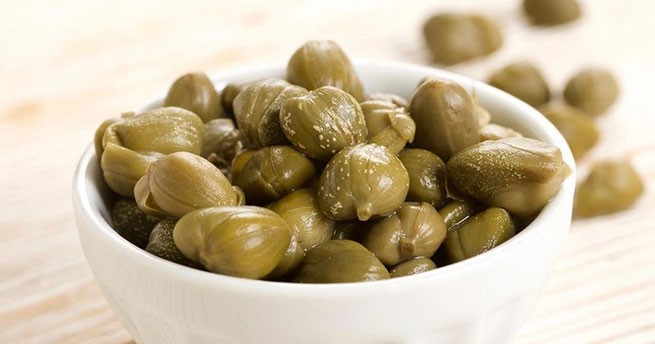Check out the nutritional content of capers and learn how they can help promote overall health.
Nutritional Profile of Capers
Capers are low in calories but rich in a number of key nutrients, making them a healthy addition to your diet.
1. Calories and Macronutrients
Capers are incredibly low in calories – only about 23 calories per 100 grams. This makes them a great choice for those who want to stick to a low-calorie diet. Capers contain a minimal amount of fat, protein and carbohydrates. In particular, per 100 grams of the product there are about 0.9 grams of protein, 0.9 grams of fat and 4.9 grams of carbohydrates.
2. Vitamins
Vitamin K. Capers are an excellent source of vitamin K, which is essential for blood clotting and bone health. A 100-gram serving of capers contains about 24.6 micrograms of vitamin K, which is well above the relative recommended daily intake.
Vitamin A. Capers also contain small amounts of vitamin A, which is important for vision and immune function.
Vitamin C. Capers contain about 4.3 milligrams of vitamin C per 100 grams, helping to maintain a healthy immune system and skin.
3. Healthy immune system and healthy skin.
Sodium (salt)Although it adds a distinctive flavor to a dish, it is important to consume salt in moderation to avoid excessive sodium intake.
Other minerals. Capers contain small amounts of calcium, iron, and magnesium, which are essential for various body functions such as bone health, oxygen transport in the blood, and muscle function.
4. Antioxidants
Flavonoids and polyphenols. Capers are rich in antioxidants, including quercetin and rutin, which fight oxidative stress and reduce the risk of chronic diseases. These compounds are known for their anti-inflammatory and anti-cancer properties.
Other antioxidants. Capers contain epicatechin and procyanidins, compounds that help increase overall antioxidant capacity.
Capers – this is ppotential health benefits due to unique combination nutrients and bioactive compounds:
1. Anti-inflammatory action
Flavonoids and polyphenols found in capers, such as quercetin and rutin, have powerful anti-inflammatory properties. These compounds reduce inflammation in the body and therefore the risk of inflammatory diseases such as arthritis and heart disease.
2. Antioxidant properties
Capers are rich in antioxidants, which protect cells from damage caused by free radicals. The high antioxidant content of capers reduces oxidative stress, which is associated with aging and the development of a number of chronic diseases, including cancer and heart disease.
3. Cardiovascular Health
The antioxidants in capers help protect the heart by reducing inflammation and preventing oxidative damage to blood vessels. In addition, the potassium content in capers helps regulate blood pressure, which helps maintain heart health.
4. Digestive Health
Capers are a good source of fiber, which supports digestive health by promoting regular bowel movements and preventing constipation. They also help maintain a healthy gut microbiome, which is essential for overall digestive health.
5. Bone health
Vitamin K, found in capers, plays a key role in maintaining bone health by supporting bone protein formation and regulating calcium levels. Adequate vitamin K intake is essential for preventing osteoporosis and maintaining strong bones.
6. Cancer prevention
The antioxidants and anti-inflammatory compounds found in capers may help prevent cancer. By neutralizing free radicals and reducing inflammation, these compounds help protect cells from DNA damage and inhibit the growth of cancer cells.
7. Skin health
Capers are beneficial for skin health due to their vitamin C content, which supports collagen production and protects the skin from oxidative damage. The anti-inflammatory properties of capers can also help reduce skin inflammation and related conditions, such as acne.







More Stories
Caution: Plague detected in arthropods
Medicines and vitamins that should not be taken with dairy products
Coffee: How the Number of Cups We Drink Affects Us